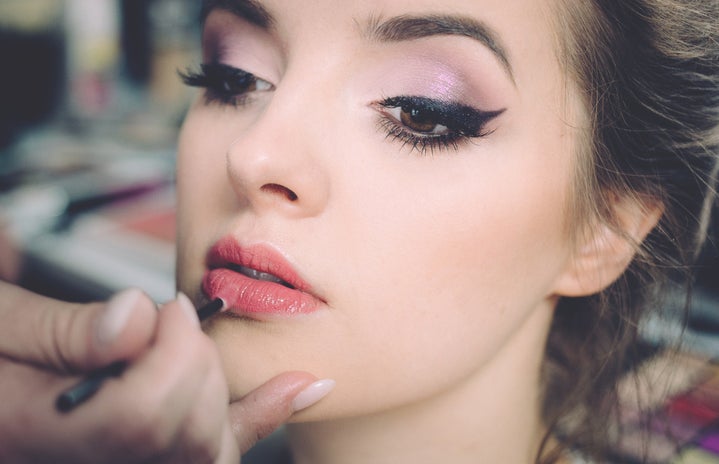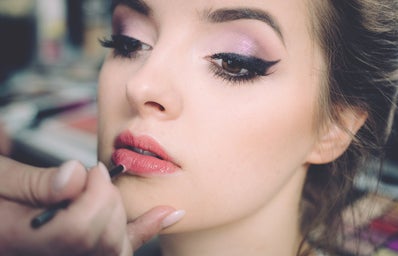When was the last time you washed your makeup brushes? Did you even know washing your brushes was a thing? Do you have the right stuff to clean them? Will water ruin them? Ahhh?????
Whether you’re new to the makeup scene or a verified influencer, makeup brushes and their cleanliness can be a struggle. For all of their benefits—think streak-free foundation, blended contour, and pigmented eye shadow—makeup brushes can harbor a lot of invisible enemies. While you probably won’t get a life-threatening infection from your brushes like this woman, acne-causing bacteria can snuggle up in the bristles of your brushes if you neglect them.
Cleaning makeup brushes can seem like a daunting process, especially if you’ve never done it. But you’ll be surprised by how easy it is to wash them. The performance of your brushes will be improved as well. When buildup from old makeup is gone, the brushes actually get a chance to work the way they’re supposed to.
Below are three different methods of brush cleaning, ranging from everyday simple options to deep, thorough washes.
Method 1: Spray and Go
This option is by far the easiest, and something you can do nearly every day after applying your makeup. Multiple brands have come out with spray-on brush cleaner. You simply spray the cleaner onto your brushes and rub them in circular motions onto a dry paper towel (or cloth towel that you won’t mind getting majorly stained).
You’ll be amazed at how much makeup and oil comes off of the brush and onto the towel. This method helps get rid of buildup. It should be noted that this isn’t a substitute for a good old fashioned wash. Basically, it’s better than nothing, but you should know that nothing replaces a deep clean.
Some spray cleaners for your brushes are E.L.F. Cosmetics Daily Brush Cleaner and NYX On the Spot Makeup Brush Cleaner Spray.
Method 2: DIY or Die
I discovered this homemade brush shampoo recipe over five years ago by none other than YouTube OG Michelle Phan. You can find the original blog post and instructions here. Basically, you need two items from your kitchen: dish soap and extra virgin olive oil (while I haven’t tested other oils, you could experiment with coconut oil or other oils of your choice).
The ratio should be 2 parts soap for 1 part oil. You can scrub your brushes on a dish plate, or simply use your hands. The dish soap (obviously) cleans the bristles, and the oil replenishes and conditions them. Just make sure to rinse well, because any leftover oil will break apart your makeup when you apply it the next day.
To dry you should hang your brushes upside down. In Michelle’s instructions, she uses clothing hangers and chip bag clips. I’ve used various methods, including shirt hangers and scrunchies, hair ties, and big clips. Whatever contraption you come up with should work! Keep in mind it’ll take 12-24 hours for them to dry completely, then you can enjoy your brushes as if they were new.
Method 3: Shop ‘Til You Drop
Last but not least is taking advantage of pre-made, scientifically tested brush cleansers and tools. There’s a plethora of makeup brush cleaners out there. Like, seriously, dozens upon dozens to choose from. It can be overwhelming, but if you pick from a brand you trust, you should be fine. I’ve found the best brush shampoos are usually from companies that also produce good makeup brushes themselves.
Nowadays, there are snazzy gadgets like little brush car washes (not the real name, but it totally should be) and textured gloves and mats to get into every nook of your brushes. While these products may take a little longer to get the job done, they really are a great way of thoroughly cleansing brushes of any oils, dirt, makeup, and dead skin (Gross but true, sorry).
The general process involves wetting the brushes, scrubbing them in the cleanser on the special mat or glove, refining the texture, and rinsing. Remember to rinse well, because just like the DIY solution, residue from the conditioners can cause makeup to break apart with the leftover oils.
Some good brush cleansers on the market are Real Techniques Deep Cleansing Gel, EcoTools Makeup Brush Cleansing Shampoo, and Sigma Sigmagic Brushampoo Liquid.
I’m not going to say you should deep clean your brushes every day, or even every week. Realistically, for people that have busy schedules, that is never going to happen. From personal experience, I find using a quick spray cleaner every two or three days is good. I try to deep clean my brushes once a month with one of the above methods. Clean brushes = good performance = a benefit to your rad makeup skills. Go and get creative with them!
Photo Sources: Cover, 1, 2, 3, 4, 5



